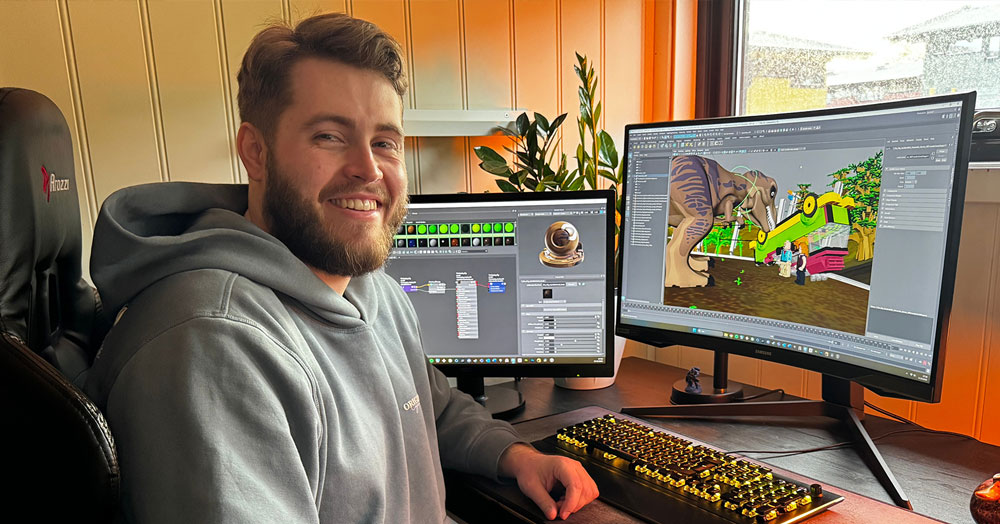After almost nine years in the workforce, Sondre Vevle realized that this wasn’t what he wanted to do for the rest of his life. But one interest had always been there: games.
Sondre often thought it would be incredibly cool to help create games himself. So he took a chance and started the 3D Design and Game Technology program at Noroff and hasn’t regretted it for a second.
A hectic but rewarding first year
When Sondre decided to start studying, flexibility was an important requirement. He knew from the beginning that he wanted to study online to have a more flexible everyday life and avoid spending time traveling to campus. After researching several schools, he chose Noroff.
– One of the reasons was the positive experiences I had heard from others. What really convinced me was the introduction video with Paul Martin Tangen. I immediately got the impression that he was a teacher who could explain things well, and that made the choice easy.
Sondre describes his first year of studies as both demanding and fun. Since he had no prior experience, there was a lot to learn. Fortunately, the program is divided into modules, allowing you to focus on one topic at a time. It helps a lot, but it requires discipline.
Even as an online student, the academic environment is solid and the teachers are always available. Sondre Vevle
As an online student, Sondre finds that the academic environment is solid and the teachers are always available. He says the teachers are highly competent and help you as soon as you need it.
– The social aspect can be a bit more challenging online, but we have good arenas on Teams and forums for collaboration. In group projects, you get to know each other better along the way.
When everything falls into place
Sondre had no prior knowledge of 3D or programming before he started, but his motivation grew quickly.
– I wasn’t really very interested in learning about 3D or how games are made, but once I began to understand how things fit together, everything changed. Now I find it incredibly exciting.
His background in media and communication from upper secondary school became a good foundation, but it was at Noroff that he was truly able to put his creativity into a system. What he appreciates most is seeing how everything connects in the process from idea to finished game.
– All the projects are different, but we build on what we’ve learned. The most educational part has been seeing the process from a simple 3D model to a finished textured model in a game engine. It’s especially fun when everything starts falling into place.
Practical learning that mirrors reality
Sondre thrives with Noroff’s practice-oriented teaching and prefers this way of learning over traditional school.
– You get theory, but it’s theory you actually use in practice. I learn much better by doing things than by just reading about them, and here we get to practise what we will actually do in the workplace.
Video: Sondre’s own work
The dream of the game industry
The dream is clear: Sondre wants to work in the game industry. He knows it's a tough field, but also that much of what they learn can be applied in several areas. The most important thing is to build experience and see where the road leads.
– Everything we do at school is connected, and everything can be used in your portfolio. The teachers also remind us of the importance of creating our own projects on the side. In addition, we get experience with the same tools used in the industry, which is essential.
A piece of advice for new students
– Don’t be afraid to make mistakes or ask questions. Everyone is here to learn. Remember to be yourself and have fun!
To others considering applying, Sondre is clear:
– I would absolutely recommend applying. I started with the first year to test it out, and ended up continuing. It’s demanding, but incredibly fun and rewarding. Don’t wait too long to take the step!
Read more about 3D Design and Game Technology.



